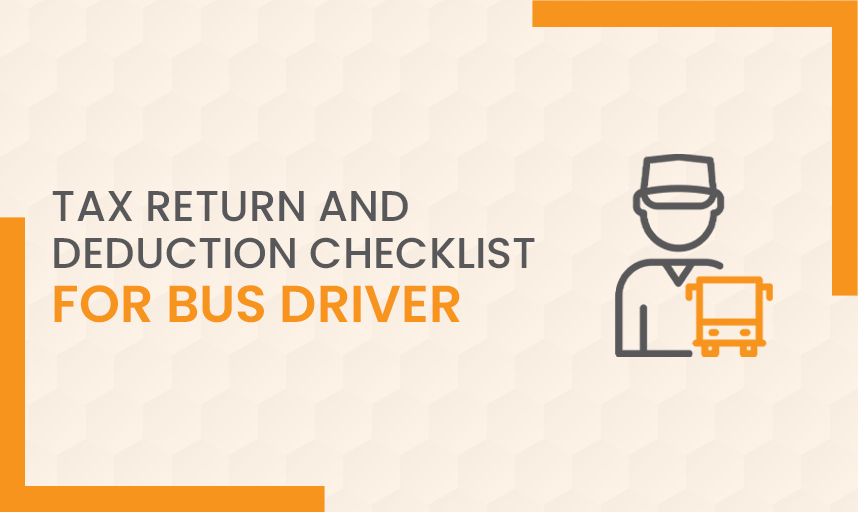Driving a bus is not just a job, it’s a responsibility that requires your utmost attention and dedication.
As a bus driver, you play a major role in keeping our communities moving.
Amidst the hustle and bustle of daily routes and passenger pickups, it’s easy to overlook the importance of managing your taxes efficiently. Also, deductions and claiming what you’re entitled to can feel challenging.
However, as we approach the end of the financial year (EOFY), bus drivers must be well-prepared to maximise their tax returns and claim all the deductions they’re entitled to.
So we decided to share a tax return and deduction checklist exclusively for bus drivers. Let’s have a quick look.
Understanding Your Income Statement
To begin your tax return process, you’ll need to obtain your income statement from your employer which is as follows:
- Income Statement: Your employer will provide you with an income statement (previously known as a payment summary or group certificate). This document provides a comprehensive overview of your earnings throughout the financial year, including salary, wages, allowances, and bonuses.
- Don’t worry about keeping a copy: The Australian Taxation Office (ATO) receives this information directly from your employer.
Claimable Deductions - What You Need to Know?
As a bus driver, you’re allowed to claim deductions on expenses directly related to earning your income. However, two critical criteria must be met:
- Personal Expenditure: You must have incurred the expense personally, without reimbursement from your employer.
- Record-Keeping: Maintaining records such as receipts or invoices is essential to substantiate your claims.
Essential Deductions for Bus Drivers
Deduction Category | Eligible Expenses | Ineligible Expenses |
Car Expenses |
|
|
Travel Expenses |
|
|
Clothing and Laundry |
|
|
Self-Education Expenses |
|
|
Other Work-Related Expenses |
|
|
Now let’s break down one by one the above Do’s and Don’ts of Claimable Deductions
Car Expenses
- Travelling between different jobs on the same day: This applies if you use your car to go from, say, your morning bus shift to your afternoon job at a supermarket.
- Travelling between different workplaces for the same employer: This includes situations like driving between different depots for the same company.
Claiming methods
- Logbook method: This requires maintaining a record of your car’s work-related usage and expenses.
- Cents per kilometre method: This method involves calculating work-related kilometres and demonstrating their work-related purpose.
Important Note: You cannot claim the cost of commuting between your home and your regular workplace, even if you have a long commute, work outside regular hours, or have split shifts.
Travel Expenses
- Travelling away from home overnight for work: This includes expenses like meals, accommodation, fares, and incidentals incurred during trips like a two-day bus tour where you stay overnight away from home.
Remember: You cannot claim deductions for travel expenses if your employer or someone else paid for them, even if you received an allowance. You’ll need to prove you spent the money yourself and the travel was directly work-related.
Clothing and Laundry Expenses
- Unique and irregular uniforms: You can claim the cost of buying, hiring, repairing, replacing, or cleaning uniforms specific to your job, like shirts with company logos.
- Protective clothing and footwear: This includes items like sunglasses and steel-capped boots that safeguard you from injury or illness related to your work environment.
Key Point: You cannot claim these deductions if your employer pays for or reimburses you. Additionally, claiming the cost of regular clothing worn at work, even if only worn for work and purchased specifically for that purpose, is not allowed.
Self-Education Expenses
- Upskilling for your current role: You can claim deductions for educational expenses directly related to maintaining or improving your current job as a bus driver, potentially leading to increased income from your current employment.
Not deductible: Courses related to getting a new job or with only a general connection to your current role are not claimable.
Other Common Deductible Expenses
- Compulsory checks and medical assessments: This includes costs associated with maintaining your employment, like working with children checks.
- Work-related portion of other expenses: Examples include:
- Overtime meal expenses you buy and eat while working overtime, provided your employer paid you an allowance under an industrial law, award, or agreement, and it’s included in your taxable income.
- Cleaning products for the bus, if required to maintain cleanliness and not provided by your employer (e.g., antibacterial products, window cleaner).
- Diaries and logbooks are used to record details like student behaviour or vehicle damage.
- A portion of phone and internet costs are used for work purposes, with detailed usage records demonstrating work-related use.
- Union and professional association fees.
What You Cannot Claim?
- Costs associated with obtaining a driver’s licence or undergoing pre-employment medical examinations, even if mandatory for your job.
- Fines for traffic violations incurred during work hours.
- Regular clothing worn to work can also be worn outside of work, even if purchased specifically for work.
- Personal expenses like music subscriptions, childcare, or car seat covers.
What If You Made A Mistake In Filling Your Claim?
Mistakes happen, and the ATO encourages you to address them promptly. While filing your return, take care to provide accurate information and supporting documentation.
Only claim genuine deductions to avoid penalties or potential prosecution. If you file your return yourself and find inaccuracies, contact KPG Taxation which has expert tax accountants who can help you handle the situation and assist with necessary amendments.
Record Keeping - The Key To Success
Keeping organised records is crucial for maximising your tax deductions. While physical receipts are acceptable, digital copies (photos or email receipts) are equally valid, provided they clearly show:
- Supplier name
- Amount of the expense
- Nature of the goods or services
- Date the expense was paid
- Date of the document
For expenses under $10, you don’t need to keep receipts, as long as the total amount doesn’t exceed $200.
When Should You Seek Professional Help?
As a bus driver, you might have to prioritise emergency trips across the city and nation, so it’s wise to seek assistance from experienced tax professionals like those at KPG Taxation.
They have dedicated tax accountants who specialise in helping bus drivers handle complex tax returns, ensuring not only meet your obligations but also optimise your financial outcomes.





